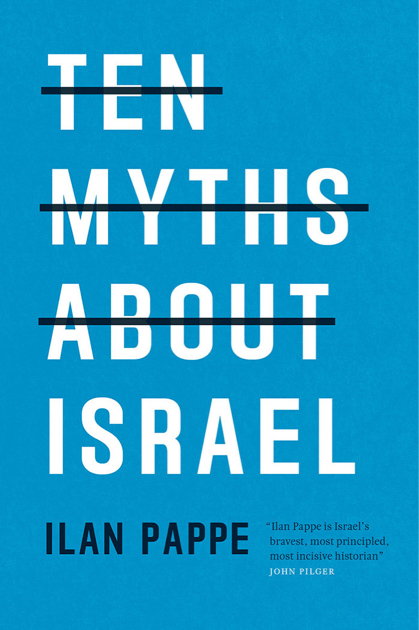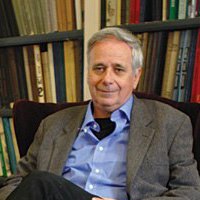Israeli Historian Exposes Zionist Lies
May 16, 2017

Ilan Pappe's new book demolishes the myths about Israel but leaves the
largest one standing, that Israel was primarily intended as a Jewish Homeland
rather than a proxy for Rothschild imperialism & the New World Order.
He dismisses the only practical ("two-state") Palestinian solution and instead calls
for an end to Israel's racist ideology. Can a leopard change his spots?
Ten Myths About Israel, Ilan Pappe, Verso Books (2017)
by Rod Such
The historian Ilan Pappe's latest work, Ten Myths About Israel, is a useful primer for people just becoming familiar with the Palestinian liberation struggle - but it is far more than that. It is also a valuable tool for veteran organizers seeking to explain cogently and simply how Israel's foundational myths and ongoing propaganda perpetuate the oppression of the Palestinian people.
While concise at 192 pages, Ten Myths About Israel points readers to many of the seminal works in Palestinian and Israeli historiography.
What are the 10 myths? Pappe divides the book into three sections: "Fallacies of the Past," "Fallacies of the Present" and "Looking Ahead."
The six myths of the past include the well-known saying, "a land without a people for a people without a land," the conflation of Zionism and Judaism, Zionism as a national liberation movement and the alleged voluntary flight of Palestinians during the 1948 war.
The three myths of the present era are the claim that Israel is a democracy, that the Oslo accords represented a genuine peace process rather than a "ploy to deepen the occupation" and that Israel's multiple attacks on Gaza were simply acts of self-defense.
The final myth looking ahead is that creating two, separate states for Israelis and Palestinians is the only way to achieve a just peace.
Although some of these topics may seem well traveled and the myths largely debunked, Pappe brings fresh scholarship and insights to each. In the process, he reveals how these past myths are still very much operational in the present.
Take, for example, the shopworn fabrication that Palestine was largely empty of people when Zionist colonists first settled there and the corresponding claim that Palestinians are an "invented people." In rebutting this myth, Pappe brings forward largely neglected works like Rashid Khalidi's book, Palestinian Identity: The Construction of Modern National Consciousness.
Few would argue today that Palestine was largely uninhabited at the time of Zionist colonization. However, the second myth - that Jews represented a people or nation without a land - is seldom challenged. Pappe probes the settler-colonial claim that the Jewish "nation" is simply returning to the land from which it was supposedly expelled more than 2,000 years ago.
Drawing on the work of Israeli historian Shlomo Sand and others, Pappe notes there is no credible historical evidence that the Jews of Roman Palestine were forcibly exiled in 70 CE. The far greater likelihood, he maintains, is that they remained on the land with many converting first to Christianity and then to Islam.

Pappe shows that the notion of a Jewish nation in diaspora originated with Christian Zionists and often aligned itself with anti-Semites seeking the expulsion of European Jews through their "return" to Palestine. Zionism was only later transmuted into a modern-day "national liberation movement."
Pro-Zionist organizations often attempt to disguise their narrow ethnocentric aims with the argument that Jews are simply reclaiming what is rightfully theirs as an indigenous people.
Although he tips his hat to Sand's research, Pappe argues that what really matters is not so much the historical inaccuracy of the claim but how this "genesis narrative" denies the rights of Palestinians and "leads to political projects such as genocide, ethnic cleansing, and oppression."
Or as The Electronic Intifada contributor Raymond Deane put it in his review of Sand's The Invention of the Jewish People: "Ultimately, the case against the Jewish state cannot be based on an unseemly tussle for genetic primacy, but on a discourse of fundamental political and human rights."
THE PEOPLE OF THE LIE
Pappe takes an alternative approach in examining other myths, such as the 1967 War, which is still regarded widely in the West as a justified preemptive attack by Israel on the Egyptian army. Several recent studies, however, have debunked the assertion of an imminent Egyptian attack on Israel, marshalling evidence instead that the Israeli military seized an opportunity to destroy Egyptian forces that had unwittingly been placed in an exposed position.
Pappe, however, builds a case - citing the work of Israeli historian Tom Segev - that a powerful lobby within the Israeli government and military, led by Moshe Dayan and Yigal Alon, had long been planning to take over Gaza and the West Bank. In fact, Pappe maintains it was a Zionist aim even before 1948 "to take over as much of Palestine as possible with as few Palestinians as possible."
As Ten Myths moves on to explore "Fallacies of the Present," the author finds it difficult to pinpoint a single representative myth. The chapters take on plural titles such as "The Oslo Mythologies" and "The Gaza Mythologies," to indicate that more than one bubble needs bursting.
Regarding Oslo, the two principal myths challenged are that the accords represented a genuine peace process and that Yasser Arafat as head of the Palestinian Authority intentionally undermined peace by encouraging terrorist attacks during the second intifada.
Regarding Gaza, the two main myths are the Israeli claim that Hamas is a terrorist organization and that Israel's 2005 settlement withdrawal from Gaza "was a gesture of peace."
OXYMORON
For this reviewer the key myth that Pappe challenges is the notion that Israel is a democracy.
The ascendancy of political Zionism within the settler-colonial movement dictated from the beginning the creation of a Jewish state that could never be democratic. The oxymoron "Jewish and democratic" betrayed the very notion that in a genuine democracy sovereignty resides in the people - all the people, not a select ethno-religious group. A democratic state is supposed to belong to all its citizens.
All the crimes that attended the creation of a Jewish state in a land that was majority Palestinian Arab - the ethnic cleansing, the apartheid, the theft of land, the alliances with imperialism and colonialism, the incremental genocide and the imposition of authoritarian rule bordering on fascism - flowed ineluctably from the idea of an ethnocentric state.
Pappe rightly concludes this primer with a critique of settler-colonialism, which he says operates on the "logic of elimination" and the "logic of dehumanization."
The concept of partition that started this crime wave will not be solved through a two-state solution, which he argues is simply another form of partition. As long as the colonialist attitude persists, Israel will never enjoy "moral legitimacy."
"Peace is not a matter of demographic change, nor a redrawing of maps," Pappe writes. Instead, "it is the elimination" of "racist ideology and apartheid policies." Whether or not an ideology can actually be eliminated remains to be seen, but without a doubt, political Zionism is both the root of the problem and the Achilles' heel of the Israeli state.
Rod Such is a former editor for World Book and Encarta encyclopedias. He lives in Portland, Oregon, and is active with the Occupation-Free Portland campaign.
---
Related- Makow - Israel's Decent into a Moral Abyss
Phil Giraldi - Palestinians to the Woodshed?
ShareThis Facebook Tweet Google + Email

You need to be a member of Saviors Of Earth to add comments!
Join Saviors Of Earth